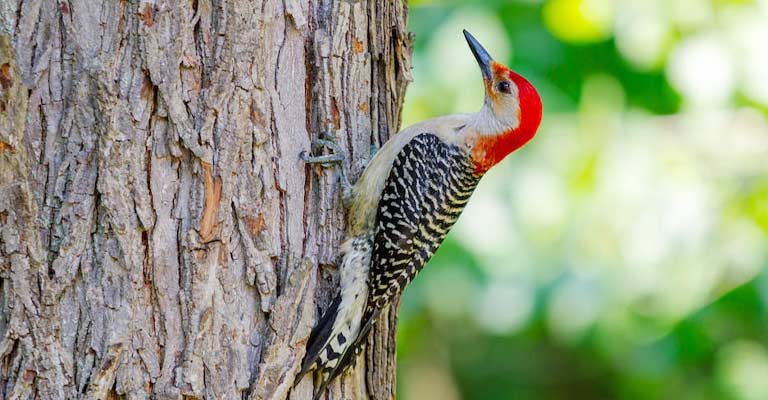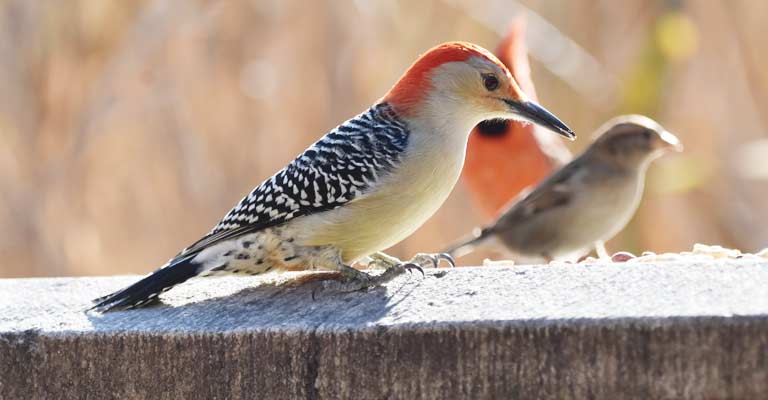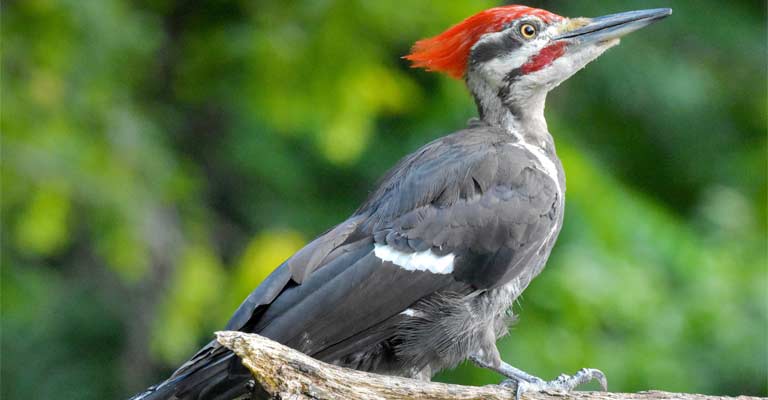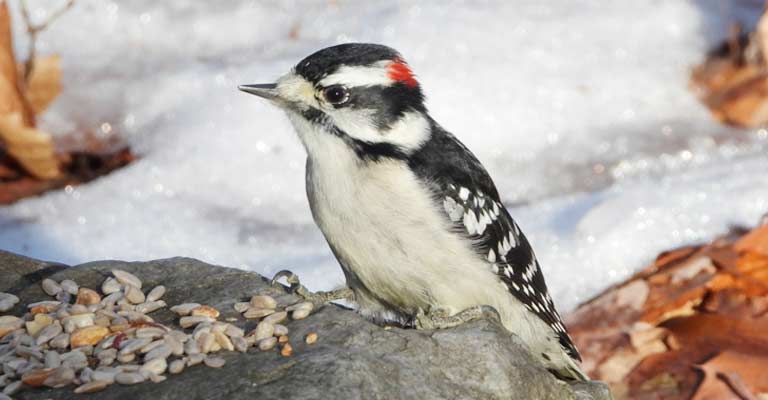In the rhythmic drumming of the woodpecker’s beak against tree bark, lies a profound language of symbolism that transcends the forests.
As ancient messengers of the natural world, woodpeckers carry with them a tapestry of meanings that traverse cultures and traditions.
In “The Ultimate Guide to Woodpecker Symbolism,” we embark on a journey to unravel the mysteries behind these feathered artisans.
From Native American folklore, where woodpeckers embody spirit communication, to Chinese symbolism associating them with luck and prosperity, we delve into the rich tapestry of cultural interpretations.
Join us as we navigate the symbolic landscapes carved by these fascinating birds, understanding the echoes of their pecking as whispers from the heart of nature itself.
This comprehensive guide aims to illuminate the nuanced meanings behind the woodpecker’s presence, providing a key to decipher the messages they bring to deciphering listen closely.

The Ultimate Guide To Woodpecker Symbolism
Woodpeckers are enigmatic messengers, carrying profound symbolism that reverberates across cultures and spiritual realms. Here, we embark on a journey to unravel the layers of meaning woven into the woodpecker’s existence.
The Drumbeat of Symbolism
As we stand at the entrance of the woodpecker’s symbolic world, we are greeted by the rhythmic drumming of their beaks against tree bark.
This introductory section sets the stage for the exploration ahead, highlighting the universal fascination with these avian percussionists and the diverse cultural interpretations that surround them.
Across Cultures: Woodpeckers as Cultural Icons
Delving into the rich tapestry of global symbolism, we uncover how various cultures ascribe unique meanings to woodpeckers.
From Native American folklore, where these birds are seen as messengers between worlds, to Chinese traditions linking them with prosperity, we witness the interconnectedness of human beliefs and the natural world.
The Woodpecker as Totem Animal: Guides to Hidden Realms

This section explores the woodpecker’s role as a totem animal, a spiritual guide that opens doors to hidden knowledge.
Examining the significance of the woodpecker as a totem, we unravel the wisdom it imparts and the spiritual realms it unlocks for those who align themselves with its energy.
Symbolic Attributes: Beyond Drumming
Beyond their distinctive drumming, woodpeckers carry a range of symbolic attributes. We delve into their nesting habits, distinctive coloring, and adaptability to unveil additional layers of meaning associated with these birds, shedding light on their comprehensive symbolism.
Lessons from Nature: Resilience and Adaptability
Woodpeckers epitomize resilience and adaptability in the natural world. This section draws parallels between the woodpecker’s ability to navigate diverse environments and the life lessons it offers to those attuned to its symbolism.
Woodpecker in Mythology and Folklore
Exploring the woodpecker’s presence in mythology and folklore, we unearth ancient tales and legends that further enrich its symbolic significance.
From being heralds of change to embodying the spirits of the forest, these stories add depth to our understanding of the woodpecker’s role in cultural narratives.
Conservation: Woodpeckers in Peril
This section sheds light on the conservation challenges faced by woodpeckers, emphasizing the importance of preserving their habitats. It serves as a call to action, urging readers to contribute to the protection of these symbolic birds and the ecosystems they inhabit.
What Does It Symbolize When You See a Woodpecker?

The sight of a woodpecker in the wild is more than a fleeting encounter with a colorful bird; it often carries profound symbolism that transcends the ordinary.
In this exploration, we unravel the layers of meaning associated with the presence of a woodpecker, diving into cultural, spiritual, and personal interpretations.
Cultural Perspectives
Woodpeckers have woven themselves into the fabric of various cultures, each attributing unique significance to their presence.
In Native American folklore, the woodpecker is often considered a messenger, bridging the gap between the earthly realm and the spirit world. The rhythmic drumming of their beaks against trees is seen as a form of communication from the divine.
In Chinese symbolism, the woodpecker is associated with luck and prosperity. Its vibrant plumage and energetic foraging are seen as auspicious signs, bringing positive energy and abundance to those who encounter it.
These cultural perspectives highlight the diverse ways in which woodpeckers are woven into the narratives of different societies.
Spiritual Guidance and Totemism
For those attuned to spiritual energies, encountering a woodpecker can be a powerful sign. In the realm of totemism, the woodpecker is considered a guide to hidden realms and a bearer of spiritual messages.
Its distinctive drumming is seen as a form of communication from the spiritual realm, urging individuals to pay attention to subtle cues and messages from the universe.
The woodpecker’s role as a totem animal extends beyond symbolism; it becomes a source of inspiration and guidance. People may resonate with the woodpecker’s qualities, such as perseverance, adaptability, and resilience, seeking to embody these traits in their own lives.
Personal Reflections: What Does It Mean for You?
Beyond cultural and spiritual interpretations, the symbolism of a woodpecker sighting can be deeply personal.
Consider the circumstances of the encounter and your own emotions at the time. Was the woodpecker prominently visible, or did it seem to appear just when you needed a moment of clarity?
Perhaps the woodpecker’s presence signifies the need to pay attention to details or a call to persevere through challenges.
It could be a reminder to adapt to changing circumstances, echoing the woodpecker’s ability to navigate various environments. Your personal reflections on the encounter add a unique layer of meaning to the symbolism.
Personal Growth
Observing a woodpecker in its natural habitat offers a glimpse into the bird’s remarkable resilience and growth. These qualities are mirrored in its symbolic significance for those who encounter it.
The woodpecker becomes a living lesson, encouraging individuals to navigate challenges with determination, to find creative solutions, and to embrace change with grace.
Signs of Change and Transformation
In some interpretations, a woodpecker sighting is considered a sign of impending change or transformation. The rhythmic drumming may symbolize the breaking down of barriers or the need to pay attention to areas of life that require renovation and renewal.
The symbolism of a woodpecker’s sighting encompasses a rich tapestry of cultural, spiritual, and personal meanings.
Whether viewed through the lens of ancient folklore, spiritual guidance, personal reflection, or the lessons derived from nature, the woodpecker’s presence invites us to pause, observe, and uncover the hidden wisdom woven into its vibrant plumage and rhythmic drumming.
What Does the Woodpecker Symbolize in the Bible?

Within the pages of the Bible, the woodpecker emerges as a creature that carries subtle yet profound symbolism. While not explicitly mentioned in the scriptures, various birds are referenced, and symbolic interpretations can be drawn from these passages.
Let’s delve into the potential meanings associated with the woodpecker in a biblical context.
Birds in the Bible: Messengers and Symbols
Throughout the Bible, birds are often used as symbols and messengers, carrying significant spiritual connotations. From the dove representing peace to the raven symbolizing God’s provision, birds play a nuanced role in biblical narratives.
In this context, the woodpecker, though not explicitly mentioned, can be considered within the broader symbolic framework of avian representation.
The Woodpecker’s Drumming: A Call to Attention
The rhythmic drumming of the woodpecker’s beak against tree bark is a distinctive feature that holds symbolic potential. In the biblical context, repetitive actions often carry spiritual significance.
The woodpecker’s persistent drumming could be metaphorically linked to the idea of persistent prayer or seeking divine attention.
Drawing inspiration from verses that encourage believers to “knock, and the door will be opened to you” (Matthew 7:7), the woodpecker’s drumming may be seen as a call to believers to persevere in prayer, to seek divine guidance, and to persistently “knock” on the door of spiritual understanding.
Adaptability and Providence
Biblical symbolism often draws on observations from the natural world to convey spiritual truths.
The woodpecker’s adaptability and ability to thrive in various environments can be metaphorically linked to the biblical theme of relying on God’s providence in different circumstances.
In passages highlighting God’s care for all creation, including the birds of the air (Matthew 6:26), the woodpecker’s resilience and resourcefulness can be viewed as a reminder of God’s provision and the importance of trusting in His guidance.
Woodpecker’s Role in Renewal
The woodpecker’s association with drumming and creating cavities in trees for nesting can symbolize the theme of renewal and transformation found in the Bible.
Just as the woodpecker transforms a tree to create a home, individuals can undergo spiritual renewal and transformation through faith.
This imagery aligns with biblical concepts of rebirth and renewal, emphasizing the transformative power of a faithful relationship with God.
Silence in the Scriptures: Drawing Symbolic Connections
While the woodpecker may not be explicitly mentioned in the Bible, interpreting its symbolism involves drawing connections between its behaviors and biblical themes.
In the absence of direct references, symbolic parallels can be drawn, enriching our understanding of the woodpecker’s potential significance in a biblical context.
FAQs
What is the significance of a woodpecker’s drumming in symbolism?
The rhythmic drumming of a woodpecker holds symbolic meaning across cultures, often representing communication from the spiritual realm or a call to attention, drawing parallels to persistent prayer or seeking divine guidance.
How do different cultures interpret woodpecker symbolism?
Various cultures attribute unique meanings to woodpeckers. For example, Native American folklore sees them as messengers between worlds, while Chinese symbolism associates them with luck and prosperity.
What lessons can be drawn from the woodpecker’s symbolism in nature?
Woodpeckers symbolize resilience, adaptability, and perseverance in the face of challenges. Observing their behaviors encourages individuals to navigate life’s obstacles with determination and embrace change with grace.
How does the woodpecker fit into the concept of totem animals?
As a totem animal, the woodpecker serves as a guide to hidden realms, offering spiritual insights and encouraging individuals to align with its qualities, such as adaptability and resilience, for personal growth.
Is there a biblical connection to woodpecker symbolism?
While not explicitly mentioned, the woodpecker’s drumming can be metaphorically linked to biblical themes, such as persistent prayer and seeking divine attention. Its adaptability may also symbolize reliance on God’s providence and themes of renewal.
Conclusion
As we’ve uncovered the diverse interpretations across cultures, the woodpecker emerges not only as a bird with a distinctive drumming cadence but as a spiritual guide, a messenger between worlds.
Whether heralding messages of communication and resilience or embodying the embodiment of prosperity and luck, the woodpecker invites us to attune our senses to the subtle rhythms of existence.
May the lessons learned from the woodpecker’s symbolic language echo in our hearts, reminding us to listen attentively to the whispers of nature, to seek wisdom in unexpected places, and to embrace the interconnectedness that binds us to the vibrant tapestry of life.
As we bid farewell to this exploration, may the woodpecker’s drumming linger as a timeless echo, an enduring reminder of the symbiotic dance between the natural world and the human spirit.